WEBINAR: This webinar explores how to measure and communicate your organization's social impact with proven frameworks and strategies that matter to stakeholders.
Purpose and Trust: Key Takeaways from Day Two of #BCConf23
Monday marked the first full day of the 2023 International Corporate Citizenship Conference in Minneapolis! This morning, attendees looked forward to building on the big ideas of last evening’s uplifting opening session, which revealed the winners of the second annual Corporate Citizenship Innovation Awards. Today, participants jumped into a day filled with topical general sessions, plentiful opportunities to connect with colleagues, and practical panels, workshops, and case study sessions from which to learn.
Attendees began the day with an Idea Exchange Breakfast, which provided a structured networking opportunity for attendees to connect with colleagues from organizations of various industries and sizes on topics like corporate giving and net zero.
To kick off the day’s first general session, BCCCC Executive Director Katherine V. Smith convened the crowd to share thoughts on how to bring CSR insights into every aspect of business.
“If you are thinking only about what's happening in your corporate department and your community involvement departments, when you're telling your story, you're leaving value on the table,” said Smith. “The world is looking at you from the outside, not in terms of your departmental structure. Corporate citizenship is the overarching identity of the firm. Who are you and what do you stand for? That is really how the world sees you and how they assess you.”
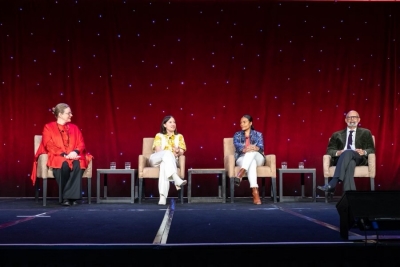
Smith was joined on stage by panelists from convening sponsor Target for a discussion about corporate philanthropy beyond financial impact. Panelists included Amanda Nusz, Senior Vice President of Corporate Responsibility at Target and President of the Target Foundation; Kiera Fernandez, Target’s Senior Vice President of Human Resources and Chief Diversity and Inclusion Officer; and Dr. Michael Lomax, President and CEO of the United Negro College Fund (UNCF).
The session focused on the importance of co-creation in developing initiatives that support communities with resources and structured programs that actively support the specific needs of a community.
“We believe in meeting people where they are,” Fernandez said. “We would accomplish nothing if dogma just got crammed down someone’s throat. It has to be integrated. It has to be thoughtful, intentional, and open to helping people move from point A to point B.”
Through the Target Scholars program, Target partners with UNCF to provide scholarships to first-year college students attending historically Black colleges and universities (HBCUs). The impact is clear: While 37% of Black college students leave school between freshman and sophomore years, 76% of Target Scholars continue schooling after their first year.
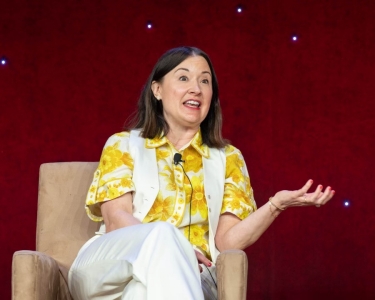
“Remember who this group is: They’re first-generation, low-income students of color and they are outperforming, on retention, their white peers,” said Dr. Lomax. “That’s saying something. It means we’re really onto something. We’ve taken some risks. Target has taken some risks. I think we can take some more.”
The panel left attendees with several key takeaways, including the idea that achieving notable results requires alignment with an organization’s purpose, as well as experts at every level who are willing to do the work.
“Know who you are. It’s important to know your brand, know who you are, and put it in on the table,” said Nusz. “I can’t understate the power of getting the right people in your enterprise at the table.”
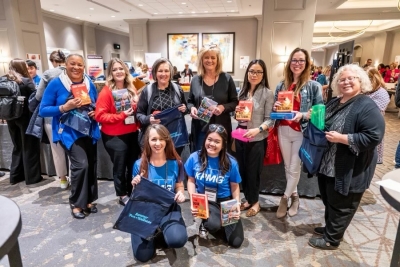
After the session wrapped, participants enjoyed more opportunities to network with a break hosted by Gallagher and continued in-depth conversations with colleagues in the Vertex Conversation Lounge. Many participants also aided in this year’s volunteer activity, hosted by KPMG. Attendees worked together to fill 500 Summer Fun and Wellness bags with hygiene and summer activity items that will be donated to the Boys & Girls Clubs of the Twin Cities.
Then, attendees were given their first opportunity to tailor their learnings to their specific interests with the first round of breakout sessions. At a case study presented by Texas Instruments Incorporated, participants learned about building coalitions with other organizations in their community to advance their corporate citizenship priorities.
In addition, attendees could choose to attend a variety of in-depth sessions on topics such as the role of corporations in boosting community resilience when natural disasters strike; CSR initiatives that support your business’s purpose and appeal to employees of varying backgrounds, experiences, and generations; measuring, reporting on, and reducing Scope 3 emissions; and moving beyond necessary compliance to develop ambitious CSR programs that look at the future of sustainability and inclusivity.
After a networking luncheon, BCCCC’s Associate Director of Member Engagement. Jess Friswell, took the stage to thank carbon-offset sponsor Xcel Energy for their generous investment which allowed BCCCC to offset more than double the carbon emissions generated by Conference, and zero waste sponsor Enbridge, whose contribution made it possible for BCCCC to compost or donate all leftover food. Then, Friswell introduced the next general session, hosted by Ally Financial.
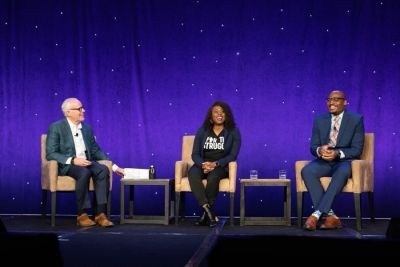
Mike Rizer, Executive Director of Corporate Citizenship at Ally Financial and President of the Ally Charitable Foundation shared thoughts on the Ally Charitable Foundation’s trust-based philanthropy journey.
“Our philanthropy continues to be predominantly in communities of color, but we really wanted to look for more and go beyond that. We came together as a company and looked at every part of our business and said, ‘What can we do differently, specifically in closing the wealth gap in Black and brown communities?’”
Part of the solution was partnering with grassroots nonprofit organizations that directly supported these communities. Rizer was joined for a panel-style discussion by leaders from two of Ally Charitable Foundation’s philanthropic partners: Alesha Brown, Founder and Executive Director of For the Struggle, a nonprofit that works to eliminate social and racial injustice in Charlotte’s historically Black corridor, and Toson Knight, Founder and President of Caught Up, a Detroit-based mentoring program for Black youth.
As both Brown and Knight noted, trust-based philanthropic strategies thrive when mutual respect between the funding organization and the nonprofit is assured. Brown emphasized the importance of funding organizations contributing resources where they’re most needed and trusting their nonprofit partners to inform that decision-making process.
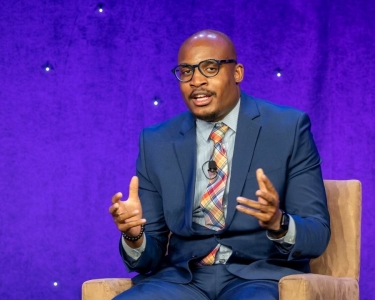
“I can't speak for every community, but I can speak for my community,” said Brown. “For the Black community, you can have all the resources in the world for them. But if they don't trust you—that you are actually doing something that's going to benefit them more than harm them—they're not even going to take advantage of those resources.”
Knight agreed.
“It’s not just about the grand idea, it’s about who’s consistently out there doing the work. We understand what needs to happen on the ground level,” said Knight. “We understand that because we're working on a consistent basis, each and every day.”
Stay tuned as we cover more highlights from the 2023 International Corporate Citizenship Conference!
Related Content
RESEARCH BRIEF - Researchers investigated how ESG activities help or hurt financial performance, using nine years of data from over 1,200 global companies.
RESEARCH BRIEF - Researchers analyzed 4 US energy exchange-traded funds (ETFs) over 15 years, including 2 dirty energy funds tracking fossil fuel companies and 2 clean energy funds tracking renewable energy companies.
RESEARCH BRIEF - Researchers conducted a survey, which measured perceptions of CSR and ethical leadership within the manufacturing and service industries.




